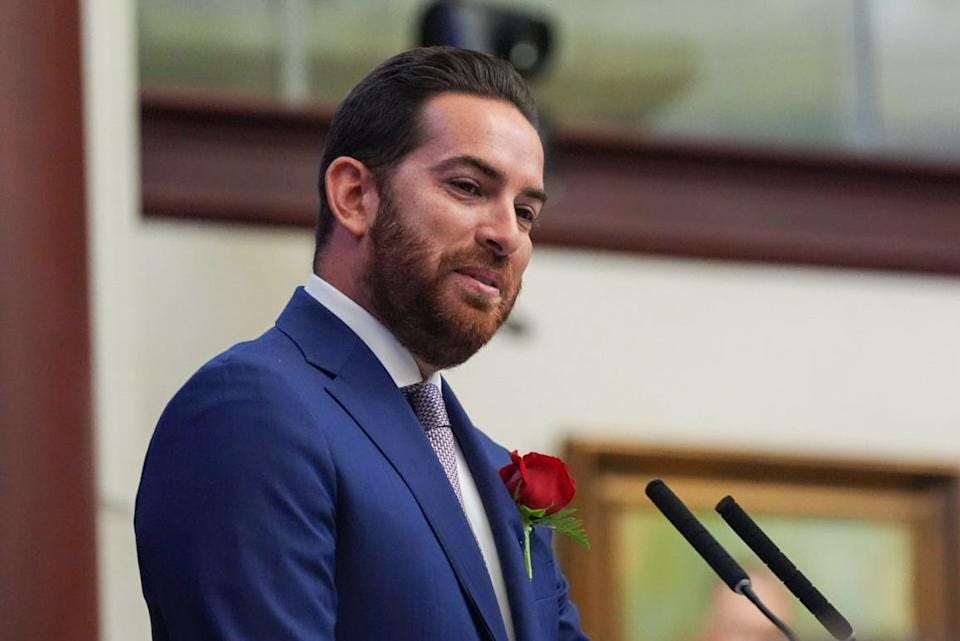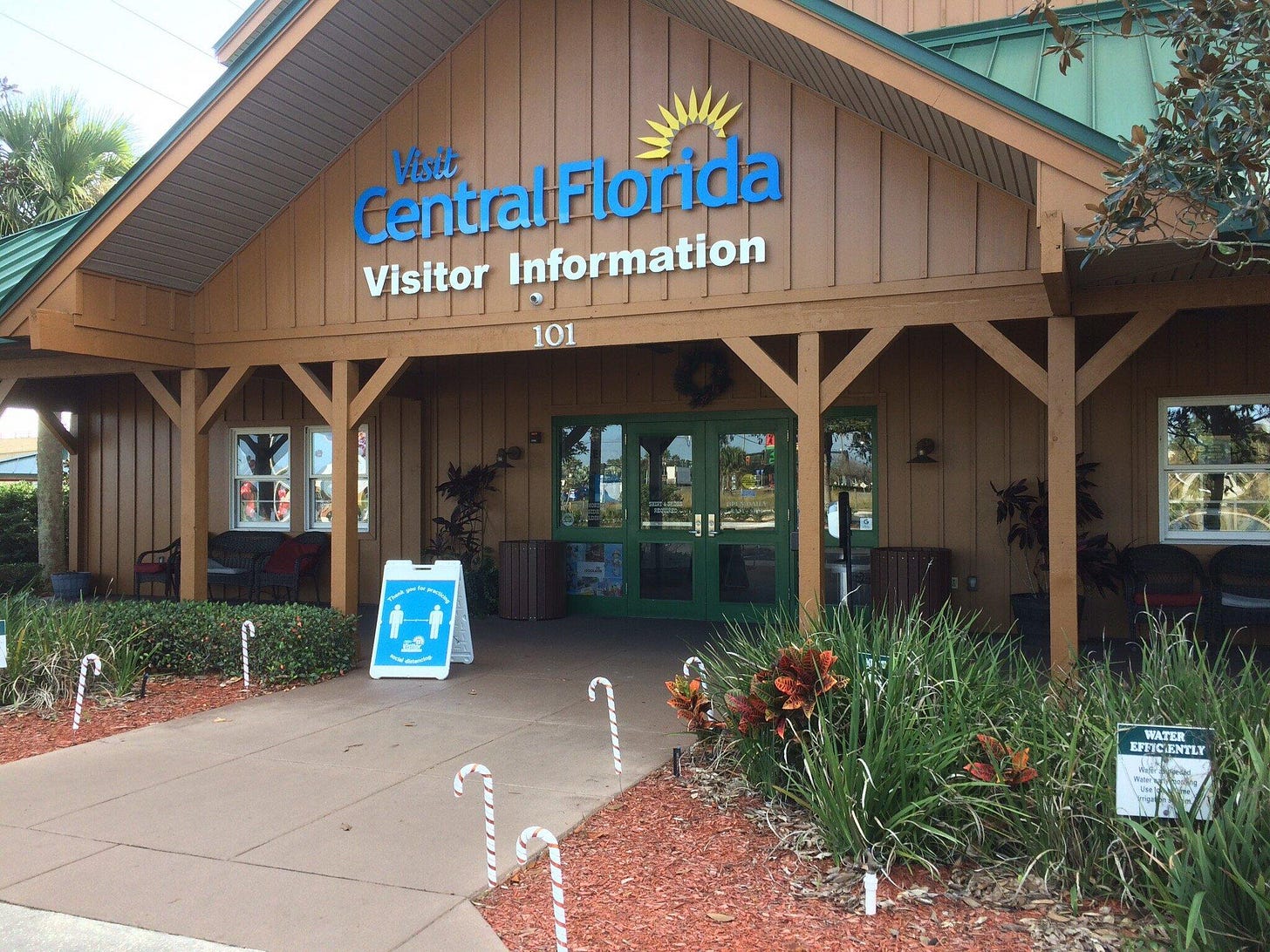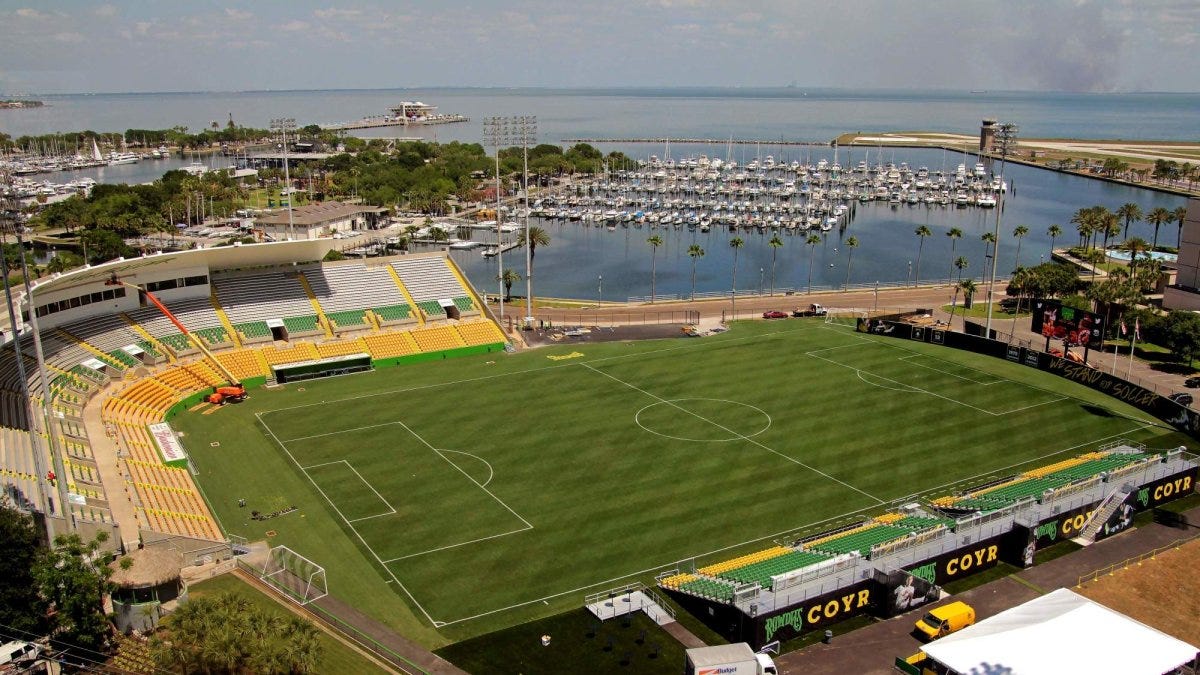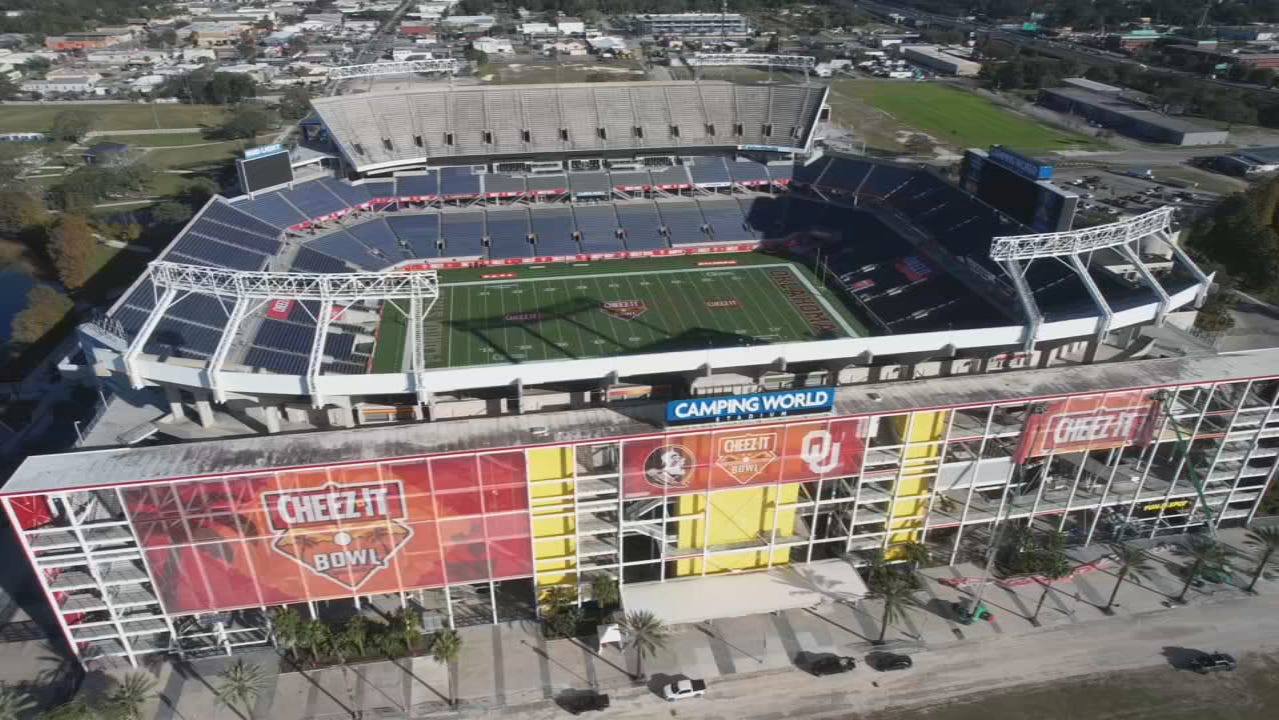800 Arrested in Statewide Immigration Operation & Legislative Committee Forms to Cut Property Taxes in 2026
May 1, 2025 - This Week's News from Central Florida
Welcome to this week’s edition of the Central Florida Times, an independent, reader-supported newsletter focusing on the Sunshine State. These are the most important stories you need to know from across Central Florida. To never miss an update, subscribe here:
Here’s the latest from Central Florida…
Operation Tidal Wave: ICE & Florida Law Enforcement Make 800 Arrests in Statewide Immigration Crackdown
A large-scale immigration operation called "Operation Tidal Wave" has led to about 800 arrests across Florida by U.S. Immigration and Customs Enforcement (ICE) under the 287(g) program. This marks the first, and one of the largest, coordinated efforts between ICE and state and local law enforcement. The six-day crackdown, launched April 21, focuses on high-population cities and counties, including Miami-Dade, Broward, Orlando, Tampa, and Jacksonville — areas with large immigrant populations. ICE officials said the operation targets “criminal individuals or immigration violators” with final deportation orders. On X, ICE described the effort as a "massive, multi-agency immigration enforcement crackdown." Governor Ron DeSantis praised the collaboration on social media, writing, “Florida is leading the nation in active cooperation with the Trump administration for immigration enforcement and deportation operations!” Nearly 230 Florida law enforcement agencies, including college and university police departments, participate in the 287(g) program, allowing officers to assist ICE in identifying, detaining, and arresting suspected undocumented immigrants. Federal authorities have not provided further details on the individuals arrested or detained during Operation Tidal Wave, or how they were targeted. While ICE says it prioritizes detaining individuals posing public safety risks, civil rights groups have raised concerns about mistaken identities and wrongful deportations without due process during such operations. The recent immigration enforcement efforts reflect the Trump administration’s broader push to expand deportations, vowing to remove over 1 million undocumented immigrants annually.
Florida House Speaker Launches Committee to Cut Property Taxes in 2026
Florida House Speaker Daniel Perez (R-Miami) is forming a new legislative committee to develop a property tax reform initiative for the November 2026 ballot. Speaking Tuesday from the House floor, the Miami Republican announced the creation of the Select Committee on Property Taxes, which will begin meeting Thursday and continue its work into the fall. “The Florida Constitution prohibits the state Legislature from exercising direct control over property taxes,” Perez said. “Any property tax reforms would need to be placed on the November 2026 ballot for consideration by the voters of Florida.” Perez outlined several possible reforms the committee will explore. Among them is a ban on foreclosing on homestead properties due to unpaid property tax liens and a requirement for local governments to hold referendums on eliminating property taxes for homesteads. Other proposals include new, larger homestead exemptions—up to $500,000 for most homeowners and $1 million for seniors or long-term residents—and a reduced cap on homestead property assessment increases. Speaker Perez stressed these proposals are a starting point, not a final plan, and welcomed input from all stakeholders, including Governor Ron DeSantis, who has publicly called for abolishing property taxes. However, the governor has not provided a detailed proposal on eliminating or significantly reducing property tax obligations for Floridians, which resulted in past criticism from Perez and a heated exchange between the two. Final language on the proposed constitutional amendments is expected before the 2026 legislative session. This development comes as lawmakers balance tax relief with the state’s fiscal responsibilities, especially as Florida faces a projected deficit of nearly $7 billion by fiscal year 2027-28.
Orlando Group Raises $1.5B to Lure Rays to Central Florida
The push to bring Major League Baseball to Orlando has gained momentum, as the Orlando Dreamers announced they have secured $1.5 billion in funding commitments to acquire a team and build a new stadium. The group, founded by late Orlando Magic co-founder Pat Williams, says “preliminary letters of intent and verbal commitments from qualified investors” have been secured to fund a stadium and acquire a team. The Dreamers’ plan centers on constructing a $1.7 billion domed stadium on a 35.5-acre site near SeaWorld Orlando and the Orange County Convention Center, across from International Drive. They hope to attract the Tampa Bay Rays, who recently backed out of a $1.3 billion stadium deal in St. Petersburg, or potentially land an MLB expansion team. The success of the venture will rely on establishing a public-private partnership to construct a domed stadium that aligns with MLB requirements. Similar to past MLB stadium projects, the Dreamers announced they have a letter of intent above $1 billion toward stadium construction costs, which would finance a significant portion of the facility. The remaining funds could potentially come from Orange County, possibly utilizing the Tourist Development Tax, but Orange County Mayor Jerry Demings has not weighed in on the proposal. The Orlando Dreamers is being led by baseball Hall of Famer Barry Larkin and Jim Schnorf, founder and president of Wall Street Strategic Capital, Inc. “We are extremely pleased with the recent rapid progress in financing interest towards prospective MLB team acquisition,” Larkin said in a statement. “Enthusiasm for an Orlando MLB franchise has hit a fever pitch,” Schnorf added. “We feel the heavy lifting part of team acquisition financing and stadium financing has been accomplished.” The group also reported that an Orlando-based “anchor investor” is ready to buy all or part of a franchise, though their identity remains undisclosed.
The proposed stadium would seat 45,000 and anchor a development expected to generate $40 billion in economic impact over 30 years. An independent study commissioned by the Orlando Dreamers in 2023 concluded that the MLB initiative would generate approximately 25,000 permanent jobs. Additionally, the study estimated that it would contribute an extra $26 million in annual tourist development taxes to the region. As the Orlando Dreamers continue their efforts to secure a professional baseball franchise, the potential economic impact of this initiative remains a key factor in garnering support from both local government and the community.
Federal Judge Reaffirms Block on Florida's Immigration Law Amid State Defiance
A federal judge has reaffirmed that all Florida law enforcement agencies must comply with her order to pause enforcement of the state’s controversial new immigration law. This announcement came during a hearing where U.S. District Judge Kathleen Williams told opposing parties that her temporary freeze applies statewide, despite conflicting guidance from Florida Attorney General James Uthmeier to disregard the injunction. He had previously issued a memo that suggested local police did not need to adhere to the judge's order as it was not binding to the agencies. The law in question, which makes it a misdemeanor for undocumented migrants to enter Florida after evading federal immigration authorities, was signed in February as part of President Donald Trump’s efforts to tighten immigration policies and border controls. The Florida Immigrant Coalition and several advocacy groups, supported by the ACLU, quickly challenged it, citing the U.S. Constitution’s Supremacy Clause, arguing that it oversteps federal authority on immigration matters. Williams initially issued a 14-day restraining order on April 4, later extending it after reports surfaced that Florida Highway Patrol officers had arrested more than a dozen people under the law, including a U.S. citizen. Though Attorney General James Uthmeier later reversed course on enforcement guidance, no new arrests have been reported since. A hearing has been scheduled for late May to consider holding Uthmeier in contempt of court.
Tourism Tax Threat: Tourism Leaders Decry Proposal to Overhaul Tourist Tax
A late-session proposal in the Florida House is drawing fierce opposition from tourism leaders across the state for threatening the future of local tourism marketing and related capital projects. The bills, HB 1221 and HB 7033, would dismantle all 62 state Tourist Development Councils (TDCs) and redirect $1.8 billion in annual tourist development tax (TDT) revenue, currently used for attracting visitors and maintaining tourism-related assets, toward property tax relief starting in 2026. The measure allows counties to allocate just 25% of hotel tax funds for tourism promotion while mandating the rest offset property taxes, potentially gutting beach preservation and renourishment and event-driven economies. Destinations Florida, the state’s group representing local tourism agencies, is mobilizing resistance across Florida, amplifying fears about job losses and labeling the tax proposal as “an act of economic sabotage.” Officials note TDT’s $1.8 billion revenue pales against $16 billion in property taxes, offering minimal household savings while risking 41,000 tourism jobs. Advocates say that the tourism revenue sustains Florida’s no-income-tax model. During a recent meeting in Polk County, Visit Central Florida Director Mark Jackson said that the proposal would result in a net savings of $58 per household in the county. Meanwhile, operations and services paid for by visitors and funded by tourist development taxes, such as beach management, parks, public safety, and tourism-related infrastructure, would fall back on Florida residents to cover. The bill permits existing debt obligations and contracts to continue but bars new tourism-focused spending without county commission approval. This would negatively impact a predominant means of financing for major entertainment and sporting venues, such as the ongoing upgrades and expansions for Orlando’s Kia Center, the Orange County Convention Center, and Camping World Stadium—all debt-backed projects that have been approved. A related Senate proposal to ease TDT spending rules is a milder adjustment. That bill caps tourism marketing and promotion expenditures at $50 million, leaving the rest to fund projects like public transit, workforce housing, or roadway improvements. State Sen. Carlos Guillermo Smith (D-Orlando), who sponsored the legislation in the Senate, referred to the House bill as “extreme,” emphasizing local governments need flexibility to fund areas that are critical to attracting and supporting tourism-dependent economies. Last year, Orange County brought in about $360 million in annual tax revenue generated by visitors through a 6% tax on hotel stays and short-term rentals. As the legislative session finalizes, counties are bracing for reduced marketing budgets and heightened pressure to aid major venues and fund public infrastructure without TDT support. However, tourism industry leaders across the state are unified in warning that the dramatic restructuring of the local option tax could backfire, costing Florida visitors, jobs, and revenue.
Controversial Insurance Lawsuit Bill Advances Amid Warnings of Rate Hikes
Lawmakers are advancing a polarizing bill that could reshape how attorney fees are handled in insurance lawsuits, despite warnings from state Insurance Commissioner Michael Yaworsky that it risks reversing previous tort reforms credited with stabilizing the state’s insurance market. House Bill 947, which passed the House with an 80-20 vote, would allow policyholders who win lawsuits against insurers to recover their attorney fees, reinstating a “prevailing party” standard eliminated in 2023 reforms. It also broadens evidence rules, allowing juries to consider average insurance reimbursement rates rather than fixed Medicare/Medicaid benchmarks in personal injury and wrongful death claims. Yaworsky cautioned this could revive inflated medical cost claims and “clog the courts,” undermining progress that saw reinsurance costs drop, 12 new insurers enter Florida, and lawsuit filings decline by 23%. Supporters, including Rep. Tyler Sirois (R-Merritt Island), say it's a necessary adjustment to fix imbalances caused by the 2023 tort reform law. “We made it too easy for insurers to delay, deny, and underpay claims,” Sirois said during floor debate. Critics, like Yaworsky, counter that HB 947 “resurrects legal incentives that made Florida an outlier in litigation,” risking higher premiums and reduced market competition. Yaworsky, however, warned the measure would unravel key reforms intended to reduce excessive litigation and stabilize insurance rates. He called the bill a threat to the “hard-won progress” made through prior tort reform efforts and said it would reintroduce legal incentives that once made Florida a “cautionary tale.” The Florida House combined the tort reform measures, reviving two-way attorney fees with an unrelated phosphate mining liability bill, which the Senate has voted to reject. The House must now decouple the bills for the measure to move forward. However, the bill’s likelihood to become law is low as Gov. DeSantis has pledged to veto any rollback of prior tort reforms.
St. Petersburg Proposes Demolition of Al Lang Stadium for Waterfront Revamp
St. Petersburg officials have unveiled a bold vision for the downtown waterfront that includes demolishing Al Lang Stadium and replacing it with a 3,000–4,000-seat outdoor amphitheater. Mayor Ken Welch’s administration recently presented the conceptual plan to the City Council as part of a $289 million downtown waterfront overhaul, aiming to better link the Mahaffey Theater and the Salvador Dalí Museum with new green spaces. While council members supported most of the proposal, the idea of removing the historic 78-year-old stadium sparked concern. The Rowdies, a USL Championship professional soccer team owned by the Tampa Bay Rays, currently call Al Lang home. Constructed in 1947, Al Lang Stadium initially served as the spring training home for the New York Yankees and St. Louis Cardinals, occasionally hosting various minor league teams in the following decades. The Cardinals maintained operations at the venue for five decades until 1997, when the facility transitioned to accommodate the newly established Tampa Bay Rays, who designated the stadium as their spring training grounds. Some council members suggested updating Al Lang to better serve concerts and events instead of tearing it down. The first phase of the proposed plan, costing $161.7 million, would construct a four-story, 1,100-car parking garage and a 50,000-square-foot conference center with retail space by 2030. Al Lang’s demolition would occur post-2028 in the $127.5 million phase two, alongside a separate 400-car garage and a new venue for the Florida Orchestra. The plan follows the Rays’ withdrawal from a $1.3 billion stadium deal at the nearby Gas Plant district, amid high tensions between Welch and team owner Stuart Sternberg. City officials are in ongoing two-year lease talks with the Rowdies, whose current agreement at Al Lang expires later this year.
Hillsborough Schools Grapple with $18M Deficit Amid Enrollment Drop
Hillsborough County Public Schools faces an $18.3 million budget shortfall this year, driven by lower-than-expected student enrollment and state funding clawbacks. Chief Financial Officer Jamie Lewis attributed over $9 million of the gap to reduced full-time student counts that was exacerbated by delayed attendance reporting caused by hurricanes Helene and Milton. Another $4.1 million loss stemmed from state overspending distributed across districts, plus a $2 million loss from last year’s final enrollment recalculations and nearly $3 million due to property tax adjustments. While the district’s reserve fund of $283 million will help offset the impact, officials expressed growing concern about deeper cuts ahead. Hillsborough school board members also voiced alarm over Florida’s expanded voucher program, which they say draws students — and funding — away from public schools without adequate oversight.
Orange County Backs $29M Effort to Attract Jacksonville Jaguars, WrestleMania
Orange County commissioners have approved over $29 million in tourist development tax (TDT) funding to compete for major football, wrestling, and mixed martial arts events to the Orlando area. In a 6-1 vote, county leaders allocated $11 million to Florida Citrus Sports to bid on hosting the Jacksonville Jaguars’ 2027 home season at Camping World Stadium while EverBank Stadium undergoes renovations. Each of the Jaguars’ eight home games could bring an estimated $20 million in economic impact, with the season potentially drawing $160 million overall. Another $18 million in funding was approved to the Greater Orlando Sports Commission to bid for four World Wrestling Entertainment (WWE) and Ultimate Fighting Championship (UFC) events from 2026 to 2031. This includes a potential return of WWE’s flagship annual event, WrestleMania, in 2031. Often referred to as the "Super Bowl of professional wrestling," Orlando last hosted WrestleMania in 2017 and generated $181.5 million in economic impact. Between the three WWE events and one UFC fight, the Greater Orlando Sports Commission estimates it could bring in 300,000 attendees and $225 million in economic impact for the region. Additional allocations include $400,000 for the 2025 AAU Junior National Volleyball Championships, $40,000 for the 2026 USA Fencing North America Cup, and $25,000 for the 2025 Pride Cup. All TDT funds, collected from hotel and short-term stays, will only be distributed if the bids are successful. While most commissioners supported the investment, Commissioner Kelly Martinez Semrad voted against it, casting doubts about the Jaguars’ ability to draw enough out-of-town visitors to offset the cost, given fans from other metro areas would have shorter drives. The Jacksonville Jaguars are likely to submit their recommendation for alternative home sites during the 2027 season to the NFL at its league meeting in Minneapolis on May 20-21.
Tampa Mayor Jane Castor Outlines City's Progress and Future in State of the City Address
Mayor Jane Castor declared that "Tampa's moment" has finally arrived, highlighting the city's progress in rebuilding and developing its neighborhoods during her annual State of the City address on Monday. She touted the city’s efforts to address aging infrastructure and become more resilient in the face of natural disasters, including Tampa’s recovery from last hurricane season. Speaking at the Tampa River Center, Castor outlined major infrastructure investments, including $94 million for wastewater improvements and $350 million for stormwater upgrades. She acknowledged neighborhoods like Davis Islands, Forest Hills, and Palmetto Beach that were especially impacted by flooding during last year’s storms, and emphasized the city's commitment to supporting residents in these areas. Tampa has pledged to invest in backup generators to improve pump station reliability and continue collaboration with state and federal partners to secure over $700 million in disaster aid. Castor also addressed Tampa’s housing challenges, stating the city has built 20,000 new residential units, with thousands deemed affordable, and that rental rates have returned to 2021 levels. “While we welcome new neighbors to Tampa, we will not price our residents out of the city that they built,” she said. Castor closed her remarks by celebrating Tampa’s transformation and community spirit: “We used to have to fight to get on the map. Now, we are shaping that map.”
Busch Gardens Unveils $40M Makeover with New Rides, Animals, and Attractions
Busch Gardens Tampa Bay is undergoing a $40 million transformation, introducing new rides, animal exhibits, and dining experiences aimed at elevating the guest experience. The investment, announced under new park president Jeff Davis, includes a wide array of improvements across the property. “This is an exciting time for the park and these investments will make it better than ever before,” Davis said, highlighting enhancements to infrastructure, staffing, and the park's visual appeal. Upgrades include a new Tree Top Drop ride, an immersive Wild Oasis splash area opening in May, and interactive climbing zones. New animal additions will include capybaras, giant anteaters, squirrel monkeys, and revamped habitats for meerkats and chimpanzees. The park is also constructing a new giraffe barn and adding accessibility improvements for its Asian elephant herd. Culinary options will expand with the Treetop Kitchen offering African and South American-inspired dishes, and new concerts and live shows are planned for the summer. Adventure Island, Busch Gardens’ water park, will also debut Castaway Falls, a new splash and play zone for families.
Lakeland Leads Nation in Foreclosures
Lakeland has recorded the highest rate of foreclosure activity among similar-sized metro areas in 2024, according to a new study by ATTOM. Experts point to Florida’s rapid population growth and escalating homeowners’ insurance premiums as contributing factors. “One in every 172 housing units experienced foreclosure activity,” the report found. This is more than double the national average. Lakeland was the fastest-growing metro area in the U.S. between 2020 and 2023, with a 12.1% growth rate. Rising home insurance costs combined with higher interest rates have pushed some homeowners beyond their financial limits. Real estate professionals view the Lakeland market as stable, but with a greater influx of residents and more homes being sold, a rise in foreclosures is predictable. Nationally, foreclosure filings declined 10% in 2024, but Florida tied New Jersey for the most activity overall, with one in every 267 homes affected.
SeaWorld Orlando’s Expedition Odyssey Ride Debuts
SeaWorld Orlando’s highly anticipated Expedition Odyssey attraction opens to the public on May 1, 2025, alongside the debut of Uki, a rescued Pacific walrus calf from Alaska. The new ride, located in the former Wild Arctic space, is a flying-theater experience that takes guests on a virtual journey across glaciers, tundra, and the depths of the Arctic Ocean. Riders will encounter stunning real-world footage of orcas, beluga whales, polar bears, seals, and walruses on a 50-foot curved screen. The attraction will deliver “thrilling, immersive storytelling with powerful, real-world animal connections,” said SeaWorld Orlando President Jon Peterson.
Thanks for reading this edition of the Central Florida Times. To never miss an update, subscribe for free:
In the meantime, if you learned something or found this read interesting, please consider sharing it to grow our community!











